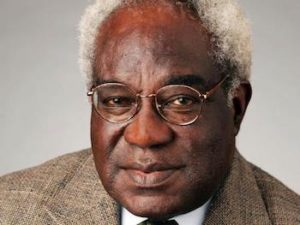
Julius Chambers
*Julius Chambers was born on this date in 1936. He was a Black lawyer, Civil Rights activist, and educator.
Chambers grew up in rural Montgomery County, North Carolina, during the Jim Crow era. As a child, Chambers saw firsthand the effects of discrimination when his father's auto repair business became a target of racism in 1948. A white customer refused to pay his father, and his father could not afford a lawyer to file suit against the man. Chambers has said that this experience made him resolve to pursue a career in law to help end segregation and racial discrimination.
After graduating high school in 1954, he enrolled at North Carolina Central University. He was the president of the student body at NCCU and graduated summa cum laude with an undergraduate degree in history in 1958. He earned a graduate degree in history from the University of Michigan.
1959, Chambers entered law school at Chapel Hill, University of North Carolina. He was the first Black editor-in-chief of the school's law review and graduated first in his class of 100 students in 1962. Chambers also became the first Black to join the Order of the Golden Fleece, the University's highest honorary society. In 1964, he earned his LL.M. from Columbia University Law School. 1963–1964, Chambers also served as the NAACP Legal Defense Fund (LDF), having been selected by their Director-Counsel Thurgood Marshall.
In 1964, Chambers began his law practice in Charlotte, North Carolina. This firm with fellow founding partners James E. Ferguson II and Adam Stein, along with lawyers from LDF, the firm successfully prosecuted several key cases before the Supreme Court of the United States that would help to shape evolving American Civil Rights laws, including the school busing decision in Swann v. Charlotte-Mecklenburg Board of Education (1971). Two important Title VII employment discrimination cases were Griggs v. Duke Power Co. (1971) and Albemarle Paper Co. v. Moody (1975).
The firm's efforts were met several times with white violence. While Chambers was at a speaking engagement in January 1965 in New Bern, North Carolina, a bomb destroyed his car. Later that year, amid the first hearings of the Swann school busing case, Chambers' home was bombed along with three other homes of black leaders; no one was injured. In 1971, Chambers' downtown Charlotte law office was also firebombed.
In 1984, he left the Charlotte firm to join the NAACP Legal Defense Fund in New York City again, this time as its highest executive (Director-Counsel). Under Chambers’ leadership, the LDF litigated cases in education, voting rights, capital punishment, employment, housing, and prisons. The LDF was perhaps best known for defending the affirmative action programs of the 1970s and 1980s during this period.
Chambers also served as a lecturer or adjunct professor at several law schools, including Harvard Law (1965), the University of Virginia Law School (1975–1978), the University of Pennsylvania Law School (1978–1986), Columbia University Law School (1984–1992), and the University of Michigan Law School (1985–1992). He also served as the Charles Hamilton Houston Distinguished Professor of Law at North Carolina Central University.
Chambers authored or contributed to several important articles and books on civil rights law, including: “Adequate Education for All: A Right, An Achievable Goal” (1987), “Beyond Affirmative Action” (1998), "Race and Equality: The Still Unfinished Business of the Warren Court,” The Warren Court: A Retrospective (1996), “Afterward: Racial Equity and Full Citizenship, The Unfinished Agenda,” African Americans and the Living Constitution (1996), “Black Americans and the Courts: Has the Clock Been Turned Back Permanently? ” The State of Black America (1990).
He supported former North Carolina Senator John Edwards in the 2008 presidential election. Chambers married Vivian Giles Chambers and had two children, Derrick and Judy, and three grandchildren. He was a member of the Alpha Phi Alpha fraternity, of which he was initiated as an undergrad into the Gamma Beta chapter. In his last years, Chambers was of counsel with Ferguson Stein Chambers Gresham & Sumter PA in Charlotte while also serving as a clinical professor of law and director of the Center for Civil Rights at UNC School of Law.
Julius Chambers died on August 2, 2013, after months of bad health. He was 76 and is survived by his two children, three grandchildren, and a brother.